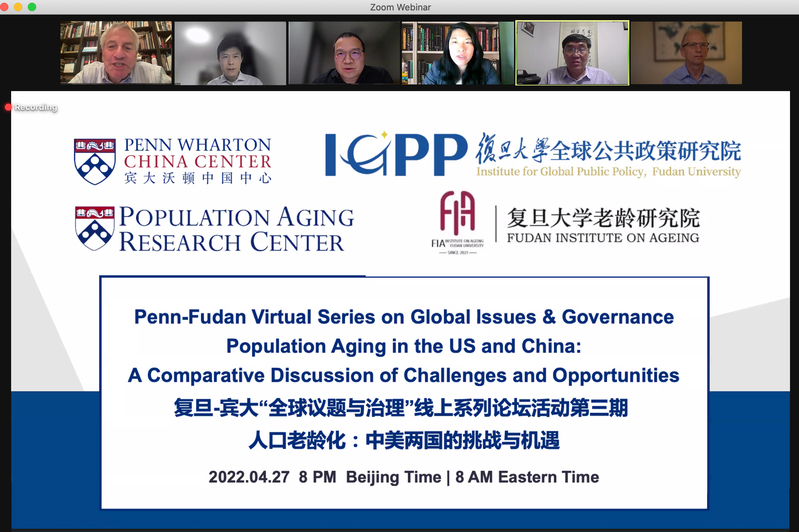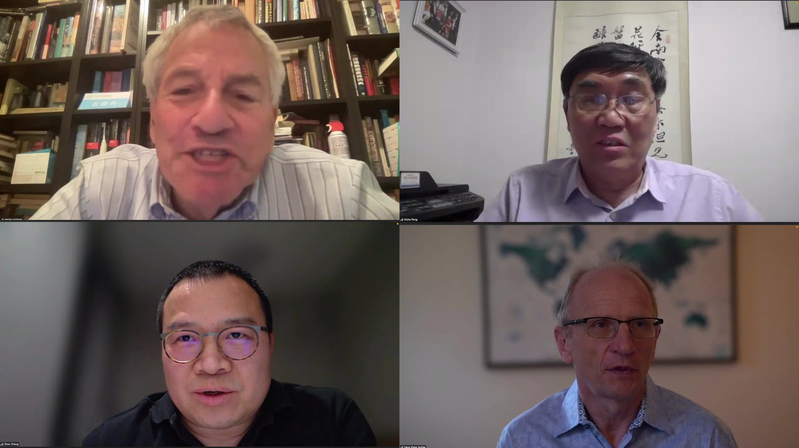
On 27th April 2022, the Institute for Global Public Policy (IGPP) of Fudan University and the Penn Wharton China Center (PWCC) jointly held the third event of the Fudan-Penn Virtual Series on Global Issues and Governance “Population Aging in the US and China: A Comparative Discussion of Challenges and Opportunities”. Nearly 1000 scholars, researchers and students participated in the virtual event.
The event invited three scholars from China and the US to have a comparative discussion on the challenges and opportunities of population aging. Professor Xizhe Peng is a Professor of Population and Development, the Director of the Institute of Population and Development Policy Studies, and the Institute of Aging Studies at Fudan University. Professor Zhen Zhang is an Associate Professor and the Deputy Director of the Center of Population and Development Policy Studies at Fudan University. Professor Hans-Peter Kohler is Frederick J. Warren Professor of Demography and the Co-Director of the Population Aging Research Center at the University of Pennsylvania. The event was moderated by Professor Dan Guttman, Adjunct Professor of IGPP.

Ms. Zoe Qiao, Senior Associate Director of PWCC, gave the welcome remarks first. Then Professor Yijia Jing, Dean of IGPP, gave the opening remarks. He pointed out that population aging has been a result of socioeconomic progress, driven by increasing life expectancy and decreasing birth rates. While both countries share some similar patterns in population aging, the vast differences between them made it unlikely that the two countries may adopt the same strategies to cope with aging. He then introduced the three speakers and the moderator.

Professor Peng gave a speech on the topic “Population aging in Mainland China”. He first introduced the basic characteristics of aging in Mainland China. He stated that China has the largest elderly population and has been one of the fastest aging processes around the world. The elderly population is normally “unprepared for old”. He suggested that China’s special political system, cultural traditions, family mentality, and the geographical situation can play a unique role in meeting the challenges of aging in China.
Drawing on the US experience, Professor Kohler stated that aging is a remarkable individual and societal accomplishment. Population aging does not necessarily hinder prosperity, yet fundamental policy and behavioral changes across many societal domains are required. He pointed out that healthy (individual) aging, which requires individual and social investments throughout the life course, is a key to successful population aging. About the challenges in low fertility, he believed increases in human capital can (partially) compensate for low fertility.
Professor Zhang gave a speech on the topic “China’s rapid rise in life expectancy: progress and challenges”. He presented the data on the rapid increase of life expectancy, overachieved lifespan equality, and challenges of chronic disease burden. He stated that China needs to deepen its health reform to avoid the risk of creating a high-cost-low-value health system as observed in some high-income countries. He suggested more front-line innovations to make health care delivery more effective and efficient throughout China.

In the Q&A session, Professor Guttman chose several questions raised by the audience for further discussion, including the aging process, pension system, and health care system of the two countries. He then moderated the panel discussion between the three speakers.
Professor Jing summarized the discussion after the Q&A session. He first thanked the speakers for sharing their insights on a variety of important issues related to population aging and governance, and then made four comments. First, intervention in aging has been a major test of human wisdom, and it is important for governments to facilitate markets, societies, families, and individuals to make autonomous adaptations. Second, it is critical to take a positive view toward aging in terms of its economic and social consequences. A holistic view of social transformation is needed. Third, innovations, including technical and institutional innovations, shall play an important role. Lastly, the many similarities and differences between China and the US demand cautious and informed learning from each other.
Professor Guttman and Director Qiao concluded the dialogue and welcomed the audience to participate in the next event.




